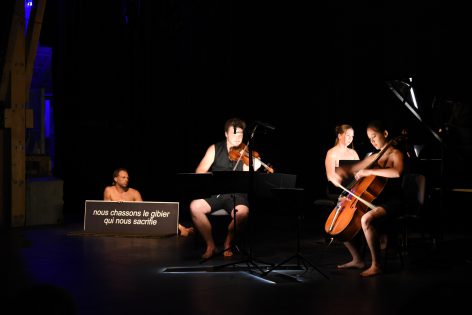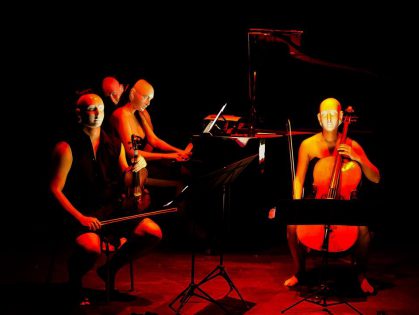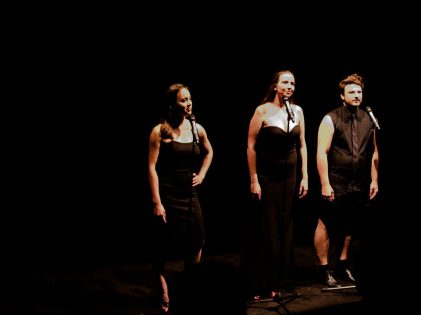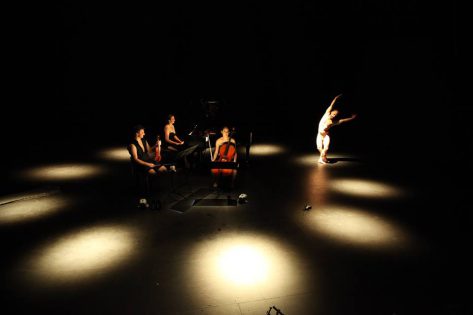



multidisciplinary
A formidable silence, an unbearable presence… and yet. Deep within us, there is room for madness, a suspended moment to listen to this persistent call. And suddenly, losing the thread, unable to grasp it again. The performance immerses us in the stream of Molly Bloom’s thoughts, which unfold like landscapes: the time of music and dance stretches so that the infinity of an uneasy, imposing, magnificent silence emerges. We find ourselves on the edge of that instant that precedes the explosion… before finally taking a breath.
This creation arises from the artistic collaboration of three musicians, a director, and a dancer around the eponymous piece by Bernd Alois Zimmermann. Composed in 1961, this ballet blanc in five acts is a space of writing where different eras of music history, different vocabularies, and varying temporal qualities resonate, intersect, and even merge.
In this trio, Zimmermann engages in a kind of treasure hunt, quoting other 20th-century composers and writers, borrowing the figures of heroes and anti-heroes, Don Quixote, Ubu Roi, and Molly Bloom, assigning each a musical and stage role frozen in a grim, even desperate eternity.
Duration: 1h20
The “PRÉSENCE” Project
PRÉSENCE is the artistic meeting of three musicians, a director, a lighting designer, and a dancer around the piece of the same name by the German composer Bernd Alois Zimmermann. It is a multidisciplinary performance exploring the infinite dimensions of temporality, capturing the moment that connects the past with what is yet to come.
Présence – Ballet blanc in five scenes for violin, cello, and piano (1961)
This work belongs to the classical keyboard trio genre and was written by Bernd Alois Zimmermann in 1961, commissioned for the Darmstadt Summer Courses. The piece exemplifies the composer’s so-called “pluralist” style: a writing space where different musical eras, vocabularies, and tempi can resonate, mingle, and even merge.
In his trio, Zimmermann cites not only other 20th-century composers, Strauss, Debussy, Prokofiev, and Stockhausen, but also writers who serve as landmarks in the global literary landscape: Miguel Cervantes (Spain), James Joyce (Ireland), and Albert Jarry (France). He borrows from them the figure of the hero—or rather the anti-hero—assigning each a musical and theatrical role that is frozen in a grim, desperate eternity.
Musicians:
-
Violin: Jérôme Faller
-
Piano: Viva Sanchez Morand
-
Cello: Joëlle Mauris
Dancer: Fabio Bergamaschi
Director: Fabrice Huggler
Lighting Designer: Philippe Maeder
Website: association-amalthea.com
Preview of the performance:
Festival Les Jardins Musicaux, Cernier, August 21 at 12:00
Website: jardinsmusicaux.ch
Premiere of the concert-performance:
May 24–28, 2017, at Théâtre Le Galpon, Geneva
Website: galpon.ch